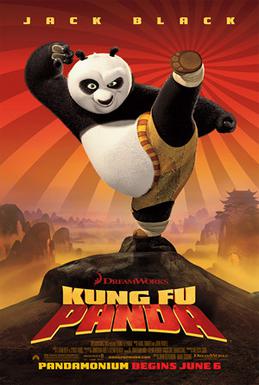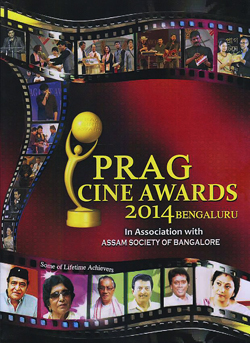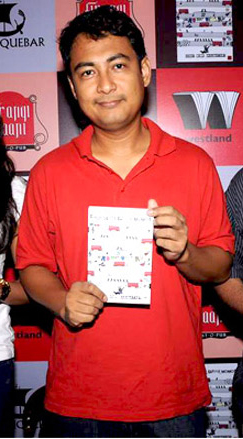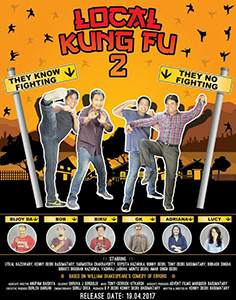
Martial arts films are a subgenre of action films that feature martial arts combat between characters. These combats are usually the films' primary appeal and entertainment value, and often are a method of storytelling and character expression and development. Martial arts are frequently featured in training scenes and other sequences in addition to fights. Martial arts films commonly include hand-to-hand combat along with other types of action, such as stuntwork, chases, and gunfights. Sub-genres of martial arts films include kung fu films, wuxia, karate films, and martial arts action comedy films, while related genres include gun fu, jidaigeki and samurai films.

The action film is a film genre that predominantly features chase sequences, fights, shootouts, explosions, and stunt work. The specifics of what constitutes an action film has been in scholarly debate since the 1980s. While some scholars such as David Bordwell suggested they were films that favor spectacle to storytelling, others such as Geoff King stated they allow the scenes of spectacle to be attuned to storytelling. Action films are often hybrid with other genres, mixing into various forms such as comedies, science fiction films, and horror films.

Drunken Master, also known as Drunken Master The Beginning, is a 1978 Hong Kong martial arts comedy film directed by Yuen Woo-ping and produced and co-written by Ng See-yuen. The film features much of the same crew as Yuen's Snake in the Eagle's Shadow released earlier the same year, including lead actors Jackie Chan, Yuen Siu-tien, and Hwang Jang-lee; although narratively unrelated, Drunken Master bears similarities to its predecessor in its story and style.

Snake in the Eagle's Shadow is a 1978 Hong Kong martial arts action comedy film directed by Yuen Woo-ping in his directorial debut. It stars Jackie Chan, Hwang Jang-lee, and Yuen Woo-ping's real life father, Yuen Siu-tien. The film's plot is about Chien Fu, an orphan who is bullied at a kung fu school, meeting an old beggar, Pai Cheng-tien, who becomes his sifu (teacher) and trains him in Snake Kung Fu.

Yuen Woo-ping is a Hong Kong martial arts choreographer and film director who worked in Hong Kong action cinema and later Hollywood films. He is one of the inductees on the Avenue of Stars in Hong Kong. Yuen is also a son of Yuen Siu-tien, a martial arts film actor. He attended the China Drama Academy for one year as a day student of Master Yu Jim-yuen as well.

Kung Fu Hustle is a 2004 martial arts action comedy film directed, produced and co-written by Stephen Chow, who also stars in the leading role, alongside Huang Shengyi, Yuen Wah, Yuen Qiu, Danny Chan Kwok-kwan and Leung Siu-lung in prominent roles. The story revolves around a murderous neighbourhood gang, a poor village with unlikely heroes and an aspiring gangster's fierce journey to find his true self. The martial arts choreography is supervised by Yuen Woo-ping.
Hong Kong action cinema is the principal source of the Hong Kong film industry's global fame. Action films from Hong Kong have roots in Chinese and Hong Kong cultures including Chinese opera, storytelling and aesthetic traditions, which Hong Kong filmmakers combined with elements from Hollywood and Japanese cinema along with new action choreography and filmmaking techniques, to create a culturally distinctive form that went on to have wide transcultural appeal. In turn, Hollywood action films have been heavily influenced by Hong Kong genre conventions, from the 1970s onwards.

Kung Fu Panda is a 2008 American animated martial arts comedy film produced by DreamWorks Animation and distributed by Paramount Pictures. The first installment in the Kung Fu Panda franchise, it was directed by John Stevenson and Mark Osborne, from a screenplay and story respectively written by the writing teams of Jonathan Aibel and Glenn Berger, and Ethan Reiff and Cyrus Voris. The film stars the voices of Jack Black, Dustin Hoffman, Angelina Jolie, Ian McShane, Seth Rogen, Lucy Liu, David Cross, Randall Duk Kim, James Hong and Jackie Chan. The film, set in a version of ancient China populated by anthropomorphic animals, centers on a bumbling giant panda named Po (Black), a kung-fu enthusiast living in the Valley of Peace. When the savage snow leopard Tai Lung (McShane) is foretold to escape imprisonment and attack the Valley, Po is unwittingly named the "Dragon Warrior", a prophesied hero worthy of reading a scroll that has been intended to grant its reader limitless power.
Kung fu film is a subgenre of martial arts films and Hong Kong action cinema set in the contemporary period and featuring realistic martial arts. It lacks the fantasy elements seen in wuxia, a related martial arts genre that uses historical settings based on ancient China. Swordplay is also less common in kung-fu films than in wuxia and fighting is done through unarmed combat.

Assamese cinema is the Indian film industry of Assamese language. It is based in Assam, India. The industry was born in 1935 when Jyoti Prasad Agarwala released his movie Joymoti. Since then the Assamese cinema has developed a slow-paced, sensitive style. In the beginning the industry were called Jollywood, for Agarwala's Jyoti Chitraban Film Studio.
Hsiao Ho, is a Hong Kong martial arts film actor, stunt performer and action choreographer. A Hakka, he has acted in many films directed by Lau Kar-leung, including Mad Monkey Kung Fu and Legendary Weapons of China. In 1985 he portrayed legendary kung fu warrior Fong Sai-Yuk in the Lau directed action-comedy, Disciples of the 36th Chamber and also took a lead role in Fake Ghost Catchers, directed by Lau Kar Wing. Fake Ghost Catchers is marketed by Celestial Pictures as being made two years before Ghostbusters. Hou is also known for portraying the "disfigured swordsman" and doubling complicated action scenes in 1993's Iron Monkey. He was also the action director for the movie Shaolin Avengers (1994). In 1982 he was nominated for Best Action Choreography for the movie Legendary Weapons of China at the Hong Kong Film Awards alongside Lau Kar Leung and Ching Chu who also provided choreography for the film.
Local Kung Fu is an indie Assamese kung fu martial arts-comedy film directed by Kenny Basumatary and the second Assamese film to have a nationwide release. It has also been dubbed as India’s first kung fu film. The film is the first installment in the Local Kung Fu film series and was produced by Durlov Baruah. A spiritual sequel, Local Kung Fu 2, was released on 19 April 2017. A third and direct sequel, Local Kung Fu 3, was released on 5 September 2024. The plot revolves around Charlie, "an ordinary boy from Guwahati with a delicate stomach"; his girlfriend; and a number of madcap characters.

The Prag Cine Awards 2014 ceremony, presented by the Prag Network, honored the actors, technical achievements, and films censored in 2013 from Assam and took place on 22 March 2014, at the Koramangala Indoor Stadium in Bangalore, India. Actors duos Kopil Bora and Zerifa Wahid hosted the show. Veteran litterateur Arun Sharma, Kannada film director Nagathihalli Chandrashekhar and Bollywood film actress Mahima Chaudhary inaugurated the event.

Kenny Deori Basumatary is an Indian actor and film director. He has appeared in Hindi and Assamese films as an actor, and as director in Assamese films. He is popularly known for directing the Assamese martial arts comedy film Local Kung Fu and its sequel, he also starred in the movie. It was nominated for best Assamese film in the inaugural Filmfare awards for the Eastern region. The budget of the film was Rs.95,000.

Adam McArthur is an American actor based in Los Angeles, California. His best-known role is voicing Marco Diaz in Star vs. the Forces of Evil, Prince Lee-Char in Star Wars: The Clone Wars, Ricky and Patrick in Shadows House, Yuri in Sakugan, Chifuyu Matsuno in Tokyo Revengers, and Yuji Itadori in Jujutsu Kaisen. He also voices characters on other animation shows, and on-screen on some nationally aired commercials. In martial arts, he specializes in kung fu, has been a champion at some tournaments, and has been the featured subject of several documentaries that have aired on PBS.

Local Kung Fu 2 is an Indian Assamese language Kung fu Martial arts-comedy film. It is directed by Kenny Basumatary and produced by Durlov Baruah. It is the spiritual sequel to 2013 film Local Kung Fu. The film is based on William Shakespeare's The Comedy of Errors. The film-makers successfully raised money for post-production through crowdfunding and the film was released on April 19, 2017.

Fist of Fury 1991 II (漫畫威龍) is a 1992 Hong Kong comedy film co-directed by Cho Chung-sing and Corey Yuen and starring Stephen Chow in the lead role. It is a sequel to the film Fist of Fury 1991 and likewise parodies Hong Kong martial arts films, including Chow appearing in a yellow tracksuit similar to the one worn by Bruce Lee in the 1973 film Enter the Dragon. Josephine Siao stars as Peony, a masked hero named after a flower parodying Black Rose, a popular character in Hong Kong films directed by Yuen Chor in the 1960s.

Local Utpaat is an Indian Assamese-language kung fu comedy film directed by Kenny Deori Basumatary.
The Local Kung Fu film series consist of Assamese Kung fu martial arts-comedy film. Created by Kenny Deori Basumatary. The films revolve around the locality of Guwahati city, and Kung fu art. The story is pushed forward by a gang of thugs, their misadventures, lackadaisical, messy, and problematic handling of their illicit activities.

The Spiritual Boxer is a 1975 Mandarin-language Hong Kong martial arts comedy film directed by Lau Kar-leung in his directorial debut.














